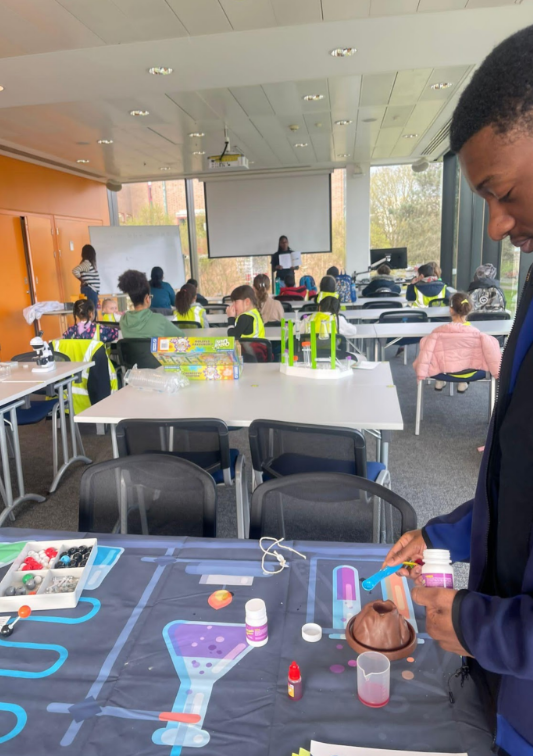Become a chemist for a day
Over the Easter holiday, I organised a one day drop-in outreach project at Reading University entitled ‘Become a chemist for a day’. The workshop comprised three main activities: a worksheet, an experiment, and an analysis exercise.
This year, the meeting had a new format, with four lunchtime webinars held fortnightly. Two speakers discussed topics in related areas, before discussion. This new format proved highly successful, with over 50 attendees at each session, the numbers slowly increasing during the course of the series.
The importance of outreach for early career scientist
Researchers have highlighted the benefits of scientific outreach projects for both participants and scientists. They found participants gain enthusiasm for science as well as a greater understanding of the topic (1). Additionally, scientists improve their communication skills, creativity, and develop the ability to show initiative (1,2). These skills are import for early careers researchers, and outreach provides a platform for learning them. Despite this, research shows that only 40% of graduate students get involved in outreach on a
frequent basis (2).
Researchers have highlighted the benefits of scientific outreach projects for both participants and scientists. They found participants gain enthusiasm for science as well as a greater understanding of the topic (1). Additionally, scientists improve their communication skills, creativity, and develop the ability to show initiative (1,2). These skills are import for early careers researchers, and outreach provides a platform for learning them. Despite this, research shows that only 40% of graduate students get involved in outreach on a
frequent basis (2).
|
The activities
In the first activity, the students were taught about the five main branches of chemistry. The second activity was the analysis exercise: the students were given water from four different sources. The four sources were representative of sea, river, tap, and a washing machine water. Students were asked to determine the different sources through a series of experiments. The last activity involved creative experimentation, where the children wore laboratory coats and safety spectacles and posed for a photo dressed up as a scientist, whilst playing with the child friendly experiment kits and molecular model kits (Molymods® ). Turnout and outcomes Overall, approximately 60 people attended, including 40 children. We used a questionnaire to evaluate the impact of the outreach events and to ultimately understand whether we achieved our aims. The core aim of this event was to stimulate the participants' passion for chemistry. This outcome was achieved and evidenced in the feedback form where one of the participants wrote the following: “The experience the girls had has provided them with a foundation to explore science. I was impressed with the organisation of the event. The experiments were engaging, and the children were happy to participate”. |
Personal reflections
This was an excellent learning opportunity for me as a PhD student, since it allowed me to learn about the grant writing process, helped me understand and handle university funds, plan an event, manage people, and communicate science to various audiences. I learnt that timeframes for organising events are often much longer than you first predict.
I definitely recommend other early careers scientists engage with outreach.
This was an excellent learning opportunity for me as a PhD student, since it allowed me to learn about the grant writing process, helped me understand and handle university funds, plan an event, manage people, and communicate science to various audiences. I learnt that timeframes for organising events are often much longer than you first predict.
I definitely recommend other early careers scientists engage with outreach.
References
1. G. Clark, J. Russell, P. Enyeart, et al., Science educational outreach programs that benefit students and scientists. PLoS Biology, 2016, 14(2):e1002368. https://doi.org/10.1371/journal.pbio.1002368
2. S.K. Rouzer, L.M. Kalinowski & E.T. Kaseda, The importance of promoting scientific advocacy & outreach for trainees. Neuropsychopharmacology, 2023, 48, 713–715. https://doi.org/10.1038/s41386-023-01530-6
1. G. Clark, J. Russell, P. Enyeart, et al., Science educational outreach programs that benefit students and scientists. PLoS Biology, 2016, 14(2):e1002368. https://doi.org/10.1371/journal.pbio.1002368
2. S.K. Rouzer, L.M. Kalinowski & E.T. Kaseda, The importance of promoting scientific advocacy & outreach for trainees. Neuropsychopharmacology, 2023, 48, 713–715. https://doi.org/10.1038/s41386-023-01530-6


